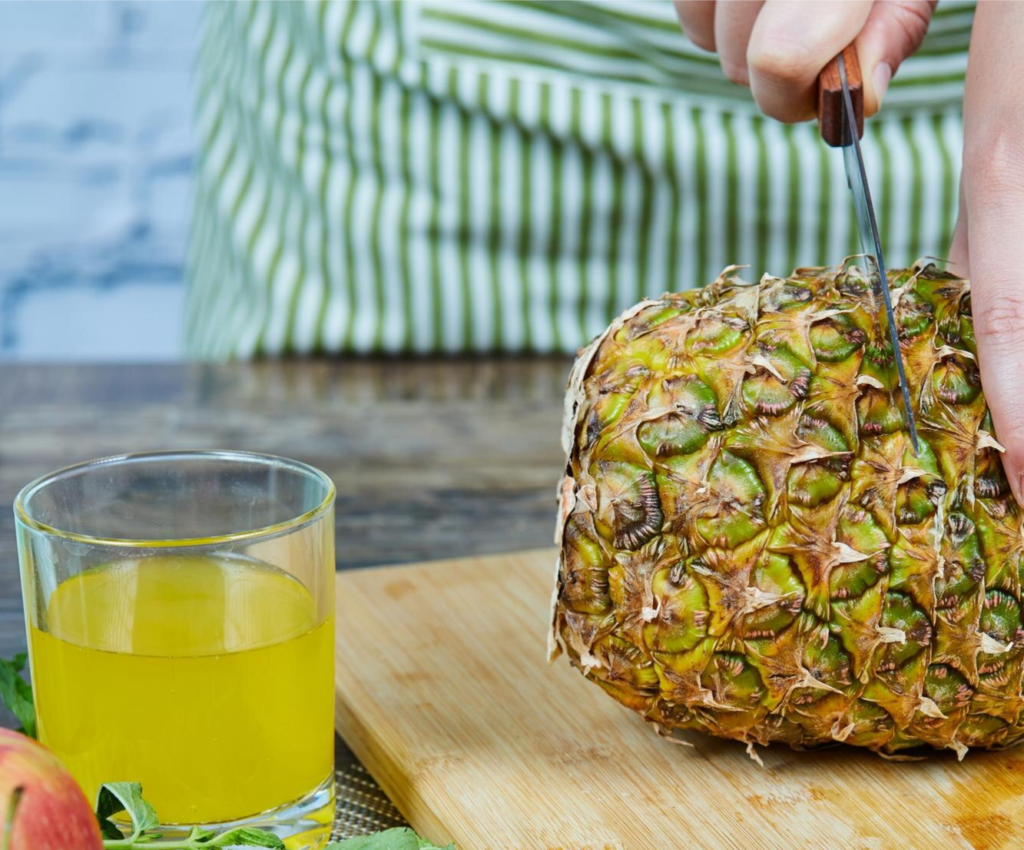When it comes to digestive health, constipation is one of the most common issues that people face. It can cause discomfort, bloating, and even affect your daily life.

Constipation happens when bowel movements become less frequent or difficult to pass, leading to a feeling of being “backed up.”
While there are various remedies to relieve constipation, one of the more natural options that people often ask about is whether pineapple can help with this issue. Let’s dive deeper into this fruit and uncover how it may impact constipation.
Understanding Constipation
Before we explore how pineapple can help with constipation, it’s important to understand the root causes and symptoms of constipation.
Constipation occurs when stool moves too slowly through the digestive tract, causing the stool to become hard and dry. The slow movement of stool can result from a lack of dietary fiber, dehydration, stress, or a sedentary lifestyle.
Sometimes, constipation may even be a side effect of certain medications or a sign of an underlying health issue.
Symptoms of constipation include:
- Infrequent bowel movements (less than three times a week)
- Difficulty or pain during bowel movements
- Feeling of incomplete evacuation
- Abdominal discomfort or bloating
- Hard or dry stools
It is important to address constipation as soon as possible to avoid further complications such as hemorrhoids, anal fissures, or even digestive disorders like irritable bowel syndrome (IBS).
The Power of Pineapple: A Nutritious, Tasty Fruit
Pineapple is not just a delicious tropical fruit; it is also packed with vitamins, minerals, and enzymes that may contribute to overall digestive health. Pineapple is rich in Vitamin C, which is crucial for immune function and skin health.
It also contains manganese, an essential mineral involved in bone health, metabolism, and antioxidant functions.
One of the most important compounds found in pineapple is bromelain, an enzyme known for its anti-inflammatory and digestive properties.
Bromelain helps break down proteins and aids in the digestive process by improving the absorption of nutrients. Given its rich nutritional profile and digestive benefits, you might wonder whether pineapple can help relieve constipation.
How Pineapple Can Help With Constipation
Let’s now look at the specific ways in which pineapple may help alleviate constipation.
High Fiber Content
One of the most well-known remedies for constipation is increasing fiber intake, and pineapple is an excellent source of dietary fiber.
Fiber plays a critical role in promoting healthy digestion by adding bulk to stool, which facilitates its passage through the intestines.
Pineapple contains both soluble and insoluble fiber. Soluble fiber dissolves in water and helps to soften stool, while insoluble fiber adds bulk and helps move stool through the digestive tract.
Consuming pineapple regularly can help improve the consistency and movement of stool, reducing the symptoms of constipation.
Bromelain and Digestive Enzymes
As mentioned earlier, pineapple contains bromelain, an enzyme that has digestive benefits. Bromelain can help break down proteins and support the digestive system in efficiently absorbing nutrients.
It also supports healthy gut flora by reducing inflammation and promoting gut motility, which can help ease constipation.
Additionally, bromelain has been studied for its ability to reduce bloating, discomfort, and indigestion. Since constipation is often accompanied by bloating and abdominal discomfort, bromelain can help reduce these symptoms, making it easier to move the bowels.
Hydration
Staying hydrated is crucial for preventing and relieving constipation. Water helps soften stool, making it easier to pass.
Pineapple is made up of approximately 85% water, which makes it a hydrating fruit that can contribute to your daily fluid intake.
Proper hydration is vital for bowel health, and adding water-rich fruits like pineapple to your diet can support the overall hydration levels of your body.
Alkalizing Effect on the Digestive System
Pineapple has an alkalizing effect on the body. This means it helps balance the acidity levels in the digestive tract, which is important for proper digestion.
When the digestive tract is more alkaline, it can function more efficiently, promoting smooth bowel movements and reducing constipation.
Promoting Gut Health
An unhealthy gut can contribute to various digestive issues, including constipation. Pineapple’s high fiber content helps promote healthy gut flora by providing prebiotics to feed the beneficial bacteria in your digestive system.
A healthy gut microbiome is essential for regular bowel movements, and consuming pineapple may help maintain a balanced and diverse microbiome.
Relieving Abdominal Discomfort
Many people with constipation experience bloating, gas, and discomfort in the abdominal region. Pineapple contains enzymes that can help break down food in the stomach and reduce bloating.
By reducing the buildup of gas in the digestive tract, pineapple may help ease some of the discomfort associated with constipation.

How to Incorporate Pineapple Into Your Diet
Now that you understand the benefits of pineapple for constipation, you might be wondering how to include it in your diet. Here are a few simple and delicious ways to enjoy pineapple:
-
Fresh Pineapple: Eating fresh pineapple is one of the best ways to take advantage of its fiber and bromelain content. Simply cut up a fresh pineapple into bite-sized pieces and enjoy it as a snack or dessert.
-
Pineapple Smoothie: You can add pineapple to your smoothies to boost the fiber content and make them extra hydrating. Combine pineapple with other fruits like mango, banana, or spinach for an extra dose of nutrients.
-
Pineapple Juice: Fresh pineapple juice is a hydrating and tasty way to enjoy the benefits of pineapple. Be sure to opt for freshly squeezed juice or juice made from whole pineapples, rather than sugary commercial juices.
-
Pineapple in Salads: Adding pineapple chunks to your salads can enhance the flavor and provide a digestive boost. Pair it with leafy greens, avocado, and a light dressing for a refreshing and healthy salad.
-
Grilled Pineapple: Grilled pineapple is a delicious treat that brings out the natural sweetness of the fruit. Grill slices of pineapple and serve them as a side dish or dessert.
-
Pineapple and Yogurt: Combining pineapple with plain yogurt can create a probiotic-rich snack. The probiotics in yogurt, along with the fiber from pineapple, can promote healthy digestion.
Potential Side Effects and Considerations
While pineapple is generally safe and beneficial for most people, there are a few things to keep in mind:
-
Allergies: Some people may have an allergic reaction to pineapple. If you experience itching, swelling, or a rash after eating pineapple, you may be allergic to the fruit.
-
Acid Reflux: Pineapple is acidic, so individuals with acid reflux or sensitive stomachs may experience discomfort or heartburn after eating pineapple. If this is the case, it may be best to consume pineapple in moderation or consult with a healthcare professional.
-
Sugar Content: Pineapple contains natural sugars, so it’s important to consume it in moderation, especially if you are managing blood sugar levels. If you have diabetes, speak with your doctor about how much pineapple you can safely include in your diet.
When to Seek Professional Advice
While pineapple can help with mild constipation, it is important to consult with a healthcare provider if you experience persistent or severe constipation.
Chronic constipation can be a sign of an underlying health issue, such as a gastrointestinal disorder, hormonal imbalance, or other medical conditions. A doctor can provide personalized advice and treatment to address your constipation.
Conclusion
Pineapple is a delicious, hydrating, and nutrient-rich fruit that may offer several benefits for relieving constipation.
Its high fiber content, digestive enzymes like bromelain, and ability to hydrate the body make it an excellent addition to a diet aimed at improving digestive health.
Whether consumed fresh, in smoothies, or added to salads, pineapple is a natural and effective way to support your digestive system.
As always, it’s important to maintain a balanced diet, drink plenty of water, and incorporate other natural remedies to keep constipation at bay.
If constipation persists or worsens, don’t hesitate to reach out to a healthcare professional for further evaluation and treatment.